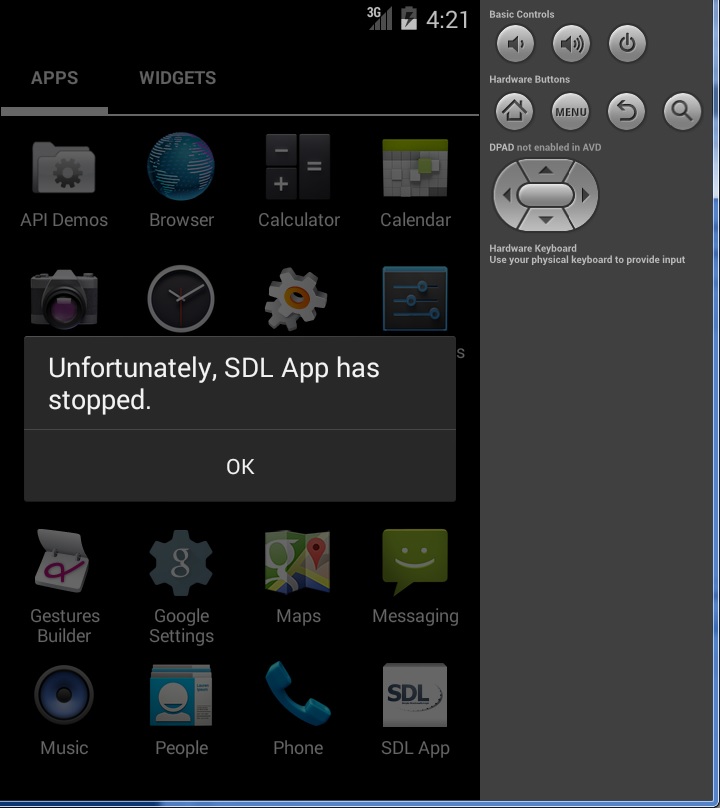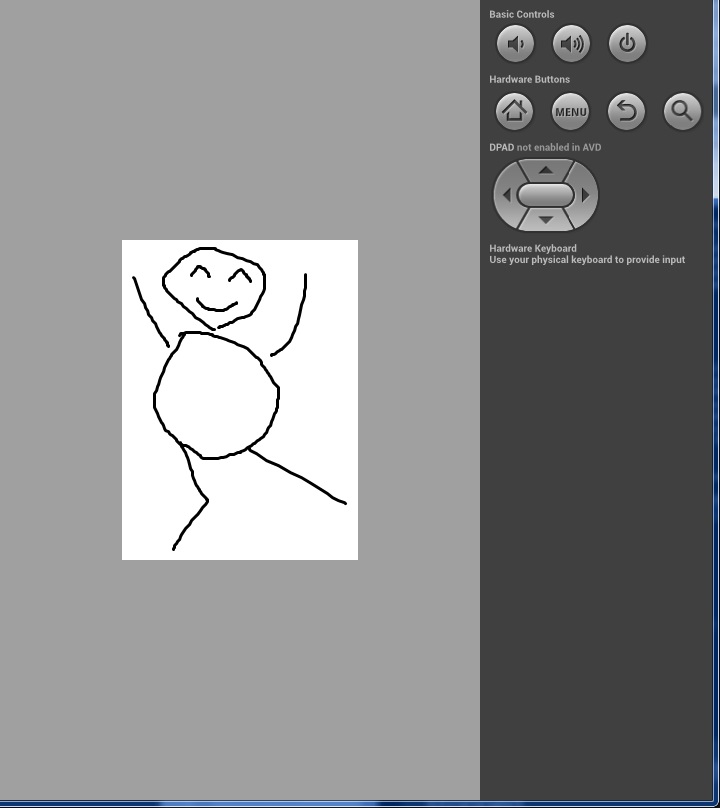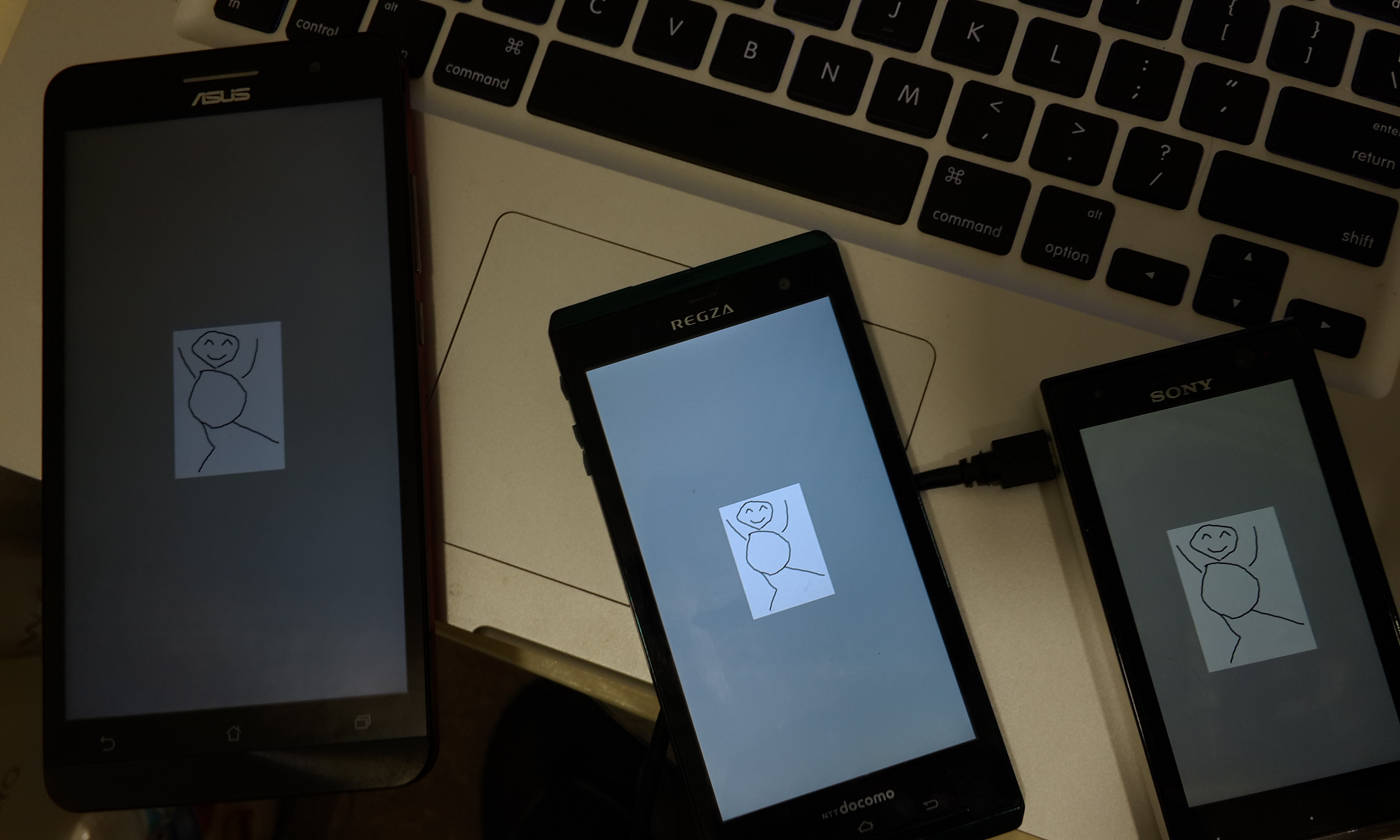Phew is this rather involved. Â First you need to download over a gigabytes worth of files. For something that is going to be embedded you need a MASSIVE amount of space.
You need:
I went ahead and installed the JDK in a normal directory, Â The same went for the Android SDK. Â The NDK is a 7zip file, that I went ahead and put at the root of my C drive because I’m that kind of guy. Â Next I unpacked ant into the NDK directory, and SDL. Â For SDL be sure to use some command line or other unzip tool that makes sure that the text files are translated appropriately, otherwise they are impossible to read in good editing tools, like notepad.
cd C:\android-ndk-r10d\
unzip -aa \Downloads\SDL2-2.0.3.zip
unzip \Downloads\apache-ant-1.9.4-bin.zip
Now to stage the project directory. Â The ‘Android project’ that we are going to build out of is *INSIDE* the SDL archive. Â And SDL needs to be inside the project directory, so we xcopy out the bits we need.
md proj
cd proj
xcopy ..\SDL2-2.0.3\android-project\*.* . /e/s
md jni\sdl
xcopy ..\SDL2-2.0.3\*.* jni\sdl /e/s
Now we need to set some environment variables. Â Again this is where my stuff is, yours may be different.
set NDK_ROOT=C:\android-ndk-r10d
set ANDROID_HOME=”C:\Program Files (x86)\Android\android-sdk\”
set PATH=%NDK_ROOT%\apache-ant-1.9.4\bin;”C:\Program Files\Java\jdk1.7.0_79\bin”;%ANDROID_HOME%\tools;%ANDROID_HOME%\platform-tools;%PATH%
Now we need to edit the jni\src\Android.mk and point it to your sources.  In this case I’m using dinomage.com‘s simple main.c &  image.bmp as I haven’t written anything exciting yet. Change YourSourceHere.c, to main.c
Now copy in the image.bmp file into the assets directory:
md assets
copy image.bmp assets
Now we can fire up the native compiler tools, and by default it’ll compile for ARM thumb, ARM v7a, and x86
..\ndk-build
Now for the java. Â Android is a java platform, so now we have to compile the wrapper that calls our C/C++ code. Â First we have to set what version of Android we are compiling for:
android update project –path . –subprojects -t 12
And now we compile with ‘ant’ by typing in:
ant debug
And if all goes well you’ll get:
BUILD SUCCESSFUL
Total time: 2 seconds
Now to run the program, we can fire up one of the emulators (you will have to configure one no doubt) using AVD. Â I just clicked around, and picked something that’d launch. Â The shell seems to crash a lot, but otherwise yeah.
Now to upload our application to the emulator once it is running:
ant debug install
And if all goes well, you’ll see:
install:
[echo] Installing C:\android-ndk-r10d\proj\bin\SDLActivity-debug.apk onto d
efault emulator or device…
[exec] pkg: /data/local/tmp/SDLActivity-debug.apk
[exec] Success
[exec] rm failed for -f, Read-only file system
[exec] 1985 KB/s (1028625 bytes in 0.506s)
BUILD SUCCESSFUL
Total time: 5 seconds
And on my first shot at running, it crashed.
Using ‘adb logcat’ on the emulator I was able to find this line:
java.lang.UnsatisfiedLinkError: dlopen failed: cannot locate symbol “signal” referenced by “libSDL2.so”…
Well it turns out signal was an inline function until platform android-21, now it’s not inline anymore. When you use the ndk r10, android-21 is used by default but it’s not fully retro-compatible with devices running former Android versions. In this case, signal can’t be found on the emulator. (It did run properly on my Lollipop phone).
Fixing this is simple just edit jni\Application.mk and add in the APP_PLATFORM line:
# Uncomment this if you’re using STL in your project
# See CPLUSPLUS-SUPPORT.html in the NDK documentation for more information
# APP_STL := stlport_static
APP_PLATFORM := android-12
APP_ABI := armeabi armeabi-v7a x86
Re-compile with ndk-build, and re-upload with ant then you are good to go.
I grabbed, and borrowed some phones around the office, including an x86 phone and yeah it works!
I haven’t even tried to cross build libraries on Windows… I suspect I should be doing this on OS X or Linux.




> use some command line or other unzip tool that makes sure that the text files are translated appropriately, otherwise they are impossible to read in good editing tools, like notepad
I’d say Notepad is not a good editing tool precisely because it only handles CRLF line endings (and the wrapping support is bad too). Have you tried Notepad++? Still easy to use, but a lot more powerful.
Changing line endings when you extract a .zip file can sometimes break things depending on the other tools you’re using, so I avoid it. Obviously it works in this case.
Yeah, I’ve tried notepad++, its the only good way to deal with chinese text when emailing stuff around.
But getting something to build and run on Android was such a massive PITA, but kind of rewarding too. I just have a bunch of other things to figure out, like screen scaling, input (which I think it sees touches like mouse taps) GPS, music and all kinds of other stuff….
in ndk12 not working
is possible to put all files in github?
I would imagine something newer has a totally different build sequence if it’s even supported.
ok,
I create ~/and directory
put main.c and image.bmp
download SDL2-2.0.4.tgz SDL2_image-2.0.1.tgz
all files in this directory:
Next i run script. (please change HO variable to correct name)
Please tell me where is problem, what change
https://gist.github.com/xor256/9df71ed00ae2aa448707696fbc2f1a86
If send me email i can send more info if You wount.
ndk r12b
sdk linux
system ubuntu or fedora
Plese help me, any sugestion,
https://github.com/xor256/SDL2-Android-jak-to-sie-robi
this is my script:
normal linux lubuntu 16.04 in ~/and (configuring in config-SDL2.sh)
i have all files: Your program.tgz library etc.
only run 0-build-SDL2.sh
program compiling sucessful but in emulator noting happened, blank screen and nothing more